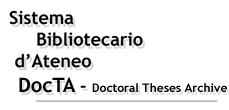|
|
DocTA - Doctoral Theses Archive >
Tesi di dottorato >
SCUOLA DI DOTTORATO IN PSICOLOGIA >
Citazione:
Utilizza queste indicazioni per citare o creare un link a questo documento.
|
Petrocchi, Serena. "THEORY OF MIND AND INTERPERSONAL TRUST IN ELEMENTARY SCHOOL CHILDREN", Università Cattolica del Sacro Cuore, XXI ciclo, a.a. 2007/08, Milano, [http://hdl.handle.net/10280/486].
|
| Titolo: | THEORY OF MIND AND INTERPERSONAL TRUST IN ELEMENTARY SCHOOL CHILDREN |
| Autore/i: | PETROCCHI, SERENA |
| Tutor: | ROTENBERG, KENNETH J.
MARCHETTI, ANTONELLA |
| Coordinatore: | SCABINI, EUGENIA |
| Lingua: | ENG |
| Abstract in italiano della tesi: | Il presente lavoro di tesi intende affrontare un tema non ancora indagato in letteratura, vale a dire l’analisi dei legami tra la comprensione mentalistica e la fiducia relazionale in bambini di scuola elementare. Tale obiettivo è perseguito in tre differenti percorsi di ricerca. Nel primo studio la Candidata ha creato un nuovo strumento di misura della fiducia relazionale nel tentativo di integrare differenti prospettive teoriche che hanno considerato la fiducia o solo come un fenomeno cognitivo o solo affettivo. Lo strumento creato (Trust Story Task), somministrato a bambini di scuola elementare dai 6 ai 10 anni, valuta le rappresentazioni mentali della fiducia intesa in senso cognitivo/mentalistico e affettivo/relazionale. I risultati dello studio mostrano le discrete proprietà psicometriche di affidabilità e validità dello strumento.
Nel secondo studio viene proposta la validazione italiana di uno strumento di valutazione delle credenze di fiducia, Children Generalized Trust Beliefs Scale (Rotenberg e al., 2005). La Candidata esamina le principali caratteristiche psicometriche di affidabilità e consistenza interna e di validità dello strumento, utilizzato poi nello studio successivo. La scala tradotta in italiano, CGTB-I, mostra discrete caratteristiche di affidabilità, di consistenza interna e di validità. La struttura fattoriale, valutata tramite alcune EFAs e CFAs, rispecchia solo in parte quella originale di Rotenberg e colleghi (2005) poiché rintraccia le tre basi di fiducia attese (reliability, emotional, honesty), ma non tutti i quattro target relazionali (madre, padre, insegnante, pari). Gli item dell’insegnante, infatti, non risultano essere significativi.
Nel terzo studio, l’obiettivo è verificare se le competenze mentalistiche e le credenze di fiducia (nella madre, nel padre e nei pari) siano predittori del comportamento di fiducia e della trustworthiness (attribuzione di fiducia che i compagni fanno rispetto a un compagno target). Le variabili indipendenti dello studio saranno considerate sia in termini individuali sia in combinazione statistica tra loro nel predire. I risultati mostrano che una buona teoria della mente e delle buone credenze di fiducia predicono in modo significativo la trustworthiness. |
| Abstract in inglese: | This thesis considers the link between theory of mind and interpersonal trust in three different studies.
First chapter outlines the crucial theoretical reflections on two constructs starting from theory of mind. First of all, I consider the meaning of the term “theory of mind”, the functions of this ability and same questions linked to terminology more often used. Moreover, I deal with the development of this ability in elementary school children, and then the most important theories on theory of mind development. As regards to the interpersonal trust, I consider the three main fields of research concerning trust as cognitive, affective and behavioural phenomenon. First paragraph shows the cognitive theories of trust that, overall, define it in term of individual’s beliefs on other’s reliability. In a second paragraph, I trait the affective face of trust starting from the point of view of the attachment theory; and, finally, in a third paragraph, I expose the studies of behavioural aspects of trust.
In the second chapter, I present a first contribution of validation of a semi-projective task on trust dimension: the Trust Story task. The aim of this measure is to evaluates the mental representation of trust both in a mentalistic and in an affective sense, considering jointly conscious and unconscious aspects and adapted to subjects’ age and gender. In particular, in my first study, I considered some characteristics of this new measure, which are reliability and construct validity.
In the third chapter, I present two studies linked each other. In the first of them, I deal with the Italian validation of the Children Generalized Trust Beliefs Scale (Rotenberg et a., 2005), questionnaire that evaluate three bases of trust beliefs (reliability, emotional, honesty) in four targets (mother, father, teacher and peer). The original version of the scale demonstrated good psychometric characteristics and an excellent flexibility of use. The CGTB-I scale derived was used in the second study that I propose in this chapter in which I examine if children’s theory of mind and their trust beliefs in others, individually, and in combination, statistically account for trustworthiness and trustworthy behaviour in children. |
| Data di discussione: | 13-mar-2009 |
| URI: | http://hdl.handle.net/10280/486 |
| È visualizzato nelle collezioni: | SCUOLA DI DOTTORATO IN PSICOLOGIA
FACOLTA' DI PSICOLOGIA
|
File in questo documento:
| File |
Dimensioni | Formato | Accessibilità |
|---|
| 01frontespizio.pdf | 123,87 kB | Adobe PDF | non consultabile
|
| testo_completo.pdf | 1,22 MB | Adobe PDF | non consultabile
|
|
Accesso e utilizzo dei contenuti di DocTA
|



